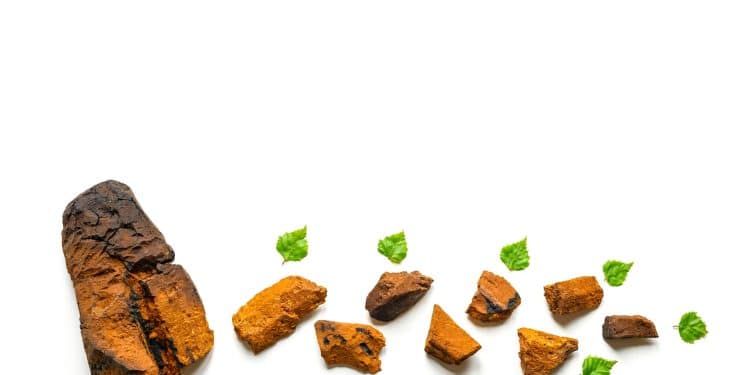Chaga has been used for years as a therapeutic tea, and the latest studies only seem to reveal even more reasons why Chaga might be a worthwhile addition to your health regimen. Understanding the benefits of chaga, though, is just one part of the picture. You will also want to know about any possible side effects from Chaga before you decide whether or not it is a good fit for your health regime. There are certain individuals that shouldn’t take Chaga, and there are also circumstances in which you might have to adjust the dose of Chaga when taking it along with other supplements and medications.
Key Points
- Negative sid effects from taking chaga are uncommon, or usually very mild if you do experience any at all. You might be at higher risk of side effects if you have an allergy to mushrooms or if you take certain medications.
- You also may have to watch your dose of chaga carefully if you have blood sugar or thyroid issues. Most people can take Chaga without causing complications, but larger dosages may result in stomach upset or renal distress.
Is Chaga Safe To Consume?
Chaga mushroom is very safe to consume. Chaga mushrooms are used in traditional cooking across the globe for a type of tea that is considered safe for most people. Those who are allergic to mushrooms, or who are taking some medications, can be highly sensitive to Chaga’s effects. In most cases, Chaga’s benefits greatly outweigh its risks, but there are a few rare possible side effects that should be kept in mind.
The Side Effects of Chaga Mushroom
1. Could Increase Bleeding
Chaga can reduce coagulation of the blood, thinning blood, potentially increasing bleeding if injured. It may not be safe for people who have bleeding disorders or those taking other medications that are blood thinners.
2. Could Lower Blood Sugar
Chaga mushrooms may potentially reduce blood sugar, meaning they might not be safe for people who have diabetes or pre-diabetes. Consuming high amounts of Chaga may cause hypoglycemia, which is a sudden decrease in blood sugar. It may also interact with insulin and other medications that affect blood sugar.
3. May Cause Lowering of Your Blood Pressure
In certain cases, chaga mushrooms may reduce your blood pressure. This can be a great benefit, but it’s something to be aware of if you’re prone to blood pressure already being too low.
4. May Cause Kidney Stones
Chaga mushrooms contain high amounts of oxalates, which are known to raise your risk for kidney stones. Those with kidney disease or other renal problems may want to avoid Chaga. You also may need to avoid Chaga if you are prone to kidney stones.
Potential Allergic Reactions To Watch Out For
Although it is uncommon, some people develop an allergy to mushrooms. Here’s a few things you could experience if you find yourself allergic to Chaga mushrooms:
- Watery eyes
- Nausea and vomiting
- Stomach cramping
- Swelling of the lips, mouth, and airways
- Difficulty breathing
- Skin rashes or hives
- Runny nose
- Bloating
- Loose stools
Chaga Mushroom Drug and Medication Interactions
In some cases, a medicinal mushroom such as chaga can interact with some over-the-counter and prescription medications, potentially decreasing its effectiveness. We discuss this in greater detail below. To be transparent, the data on the potential side effects of Chaga in combination with other drugs or substances is thin, so much more research is needed on specific medications and their interactions with chaga mushroom. If you are taking the following types of medications you may want to talk to your doctor before supplementing chaga mushroom.
- Thyroid medications
- Antidepressants
- Anti-anxiety medications
- Blood pressure medications
- Diabetes medications
You should talk to your healthcare provider about chaga before starting your dosing regimen if you are already taking one or more prescription medications on a daily basis. Chaga is generally safe to take, but you will need to adjust the dose and dosing schedule. Work with your health care provider to monitor for any side effects of Chaga when combined with other supplements and medications.
Can Chaga Mushroom Be Addictive?
Chaga does not affect your body’s hormonal releases directly, like a lot of pharmaceuticals that are highly addictive. It is not addictive, with virtually no potential for abuse or dependence.
Who Should Not Take Chaga Mushroom?
In most cases, Chaga can safely be taken with no complications, however, there are some individuals that might need to make specific arrangements for taking Chaga. These would include those who:
- Are expecting surgery in the next two weeks
- Have a thyroid disorder
- Have a bleeding disorder
- Are diabetics
- Have an immune system disorder
- Take blood pressure medication
- Are pregnant or breastfeeding
Chaga FAQ’s
Does chaga mushroom damage kidneys?
Chaga mushrooms have high oxalate contents, which can potentially adversely affect your kidneys. Chaga might not be safe for anyone who has pre-existing kidney conditions or is prone to kidney stones.
Can you take Chaga mushroom everyday?
Yes, chaga can be taken on a daily basis, and this is probably the best way to get its best therapeutic benefits. It can take up to two weeks of taking Chaga regularly to experience the full effects of your new dosing regimen.
Is Chaga mushroom good for your body? What does chaga do to your body?
Chaga is thought to have a variety of therapeutic effects, helping soothe inflammation and improve immune function, but further research is needed to understand those benefits.
What happens if you drink too much chaga tea?
Chaga is high in natural minerals and fiber, and in a moderate dosage, it may benefit your body. In higher doses, excessive consumption of these minerals and fibers may cause stress to your kidneys and upset your stomach. Large amounts of chaga may have a laxative-like effect. Most sources recommend taking no more than 2-3 cups of Chaga tea a day.
Additional Resources:















